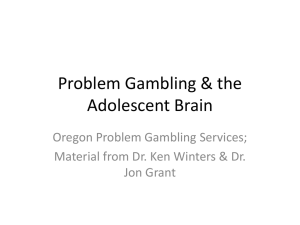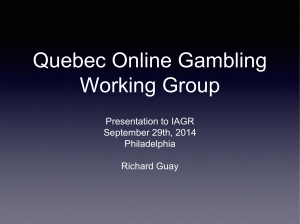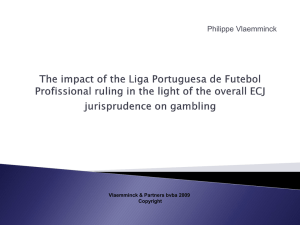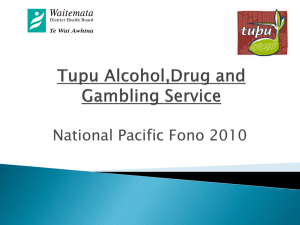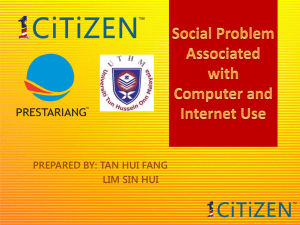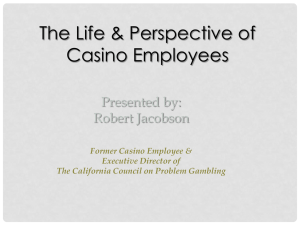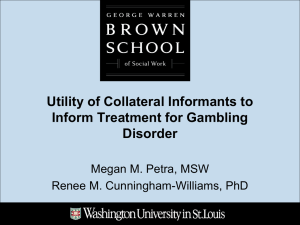May 17, 2007 Compulsive Gambling & Comorbidity - MI-PTE
advertisement
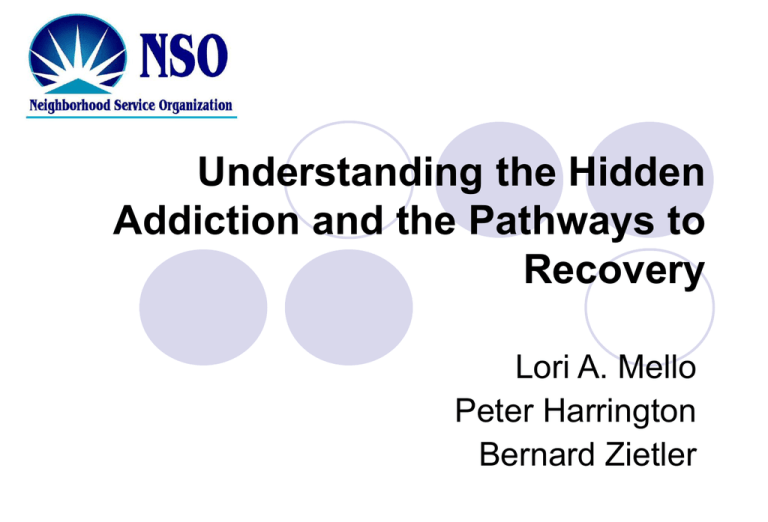
Understanding the Hidden Addiction and the Pathways to Recovery Lori A. Mello Peter Harrington Bernard Zietler History of Neighborhood Service Organization Established in 1955 as a private non-profit human service agency. The Mission of NSO is to provide diverse and innovative community development programs and community services to meet the changing needs of the regions population. We are “ALWAYS WITHIN REACH” Prevention and training are fundamental components of our programs. These components empower consumers and enhance the skills of other professionals. Michigan Problem Gambling Help Line and Treatment Program 1-800-270-7117 Problem Gambling Services are administered by the Michigan Department of Community Health Bureau of Substance Abuse & Addiction Services, which are provided through a contract agreement with Neighborhood Service Organization (NSO). MICHIGAN PROBLEM GAMBLING 24 HOUR HELPLINE 1-800-270-7117 Statewide Helpline funded by the Michigan Dept. of Community Health, Bureau of Substance Abuse and Addictions Services Comprehensive Screening Treatment and Information Referrals Referral to GA/Gamanon Crisis Intervention Speakers Bureau History and Operation of the Michigan Problem Gambling Helpline The MPGHL is: A 1-800 helpline for individuals experiencing problems with gambling Funded by the Michigan Department of Community Health through Neighborhood Service Organization since 1999 It is and has always been statewide On the Helpline, we: emphasize to callers that help is available regardless of their insurance status or financial difficulties. help with referrals to community-based mutual support groups such as Gamblers Anonymous and Gamanon when appropriate and available Definition of Gambling Gambling: Any betting or wagering, for self or others, whether for money or not, no matter how slight or insignificant, where the outcome is uncertain or depends upon chance or skill constitutes gambling. To risk money or something of value on the outcome of a game, contest or other event. The History of Gambling in the United States Postcard, circa 1910 A Brief History… In 1978 only two states had legalized casino gambling – New Jersey and Nevada. In 1998, only two states did NOT have some form of legalized gambling. This statement underscores the phenomenal growth of the gambling industry and the exposure of individuals from all walks of life to it. In the United States, gambling is a $40 billion industry and some type of legal gambling opportunity is now available in every state except Utah and Hawaii. Gambling appears to be a common pursuit of older Americans. In a 2001 study, seniors rated a trip to a casino as their most popular day-trip social outing. Prevalence of Compulsive Gambling Two million (1%) of U.S. adults are estimated to meet criteria for compulsive gambling in a given year. Four to eight million (2-3%) would be considered problem gamblers they do not meet the full diagnostic criteria for compulsive gambling They do meet one or more of the criteria however They are experiencing major problems due to their gambling behavior. “A Survey of Gambling Behaviors in Michigan, 2006” Number of residents currently having a gambling problem is 146,854. This estimate is equivalent to about 1 out of every 50 residents aged 18 and older. This is a decrease from 205,596 (28%) in 2001. Of this number 66,000 are estimated to be “probable pathological gamblers”. That is about 1 out of every 110 Michigan residents aged 18 and older. Types of Gambling Casino Cards Dice Roulette Slot Machines Video Poker Lottery Racetrack Keno, Pull Tabs Internet Sports Bingo Why People Gamble Recreation and entertainment Relaxation Excitement Attempt to make money Attempt to feel better Escape from feelings of loneliness, anxiety, depression, boredom To feel important Inability to stop gambling Types of Gamblers Social Gambler Most individuals fall into this category. Their gambling activity does not create financial, social or behavioral problems. Problem Gambler Individuals in this category experience problems related to their gambling activity. Problems with family relationships and increasing debt are often present in this stage. Types of Gamblers (cont’d) Compulsive/Pathological Gambler This term is used to describe individuals who meet DSM IV diagnostic criteria. Individuals in this category are experiencing major life problems related to their gambling activity. DSM IV Pathological Gambling Diagnostic Criteria A. Persistent and recurrent maladaptive gambling behavior as indicated by five or more of the following: Is preoccupied with gambling (e.g., preoccupied with reliving past experiences, handicapping or planning the next venture, or thinking of ways to get money with which to gamble) Needs to gamble with increasing amounts of money in order to achieve the desired excitement Has repeated unsuccessful attempts to control, cut back, or stop gambling. Is restless or irritable when attempting to cut down or stop gambling. Gambles as a way of escaping from problems or of relieving a dysphoric mood (e.g., feelings of helplessness, guilt, anxiety, depression). DSM IV DIAGNOSTIC CRITERIA (CONT’D) B. After losing money gambling, often returns another day to get even (“chasing” one’s losses). Lies to family members, therapist or others to conceal the extent of involvement with gambling. Has committed illegal acts such as forgery, fraud, theft, or embezzlement to finance gambling. Has jeopardized or lost a significant relationship, job, or educational or career opportunity because of gambling. Relies on others to provide money to relieve a desperate financial situation caused by gambling. The gambling is not better accounted for by a Manic Episode Characteristics of Compulsive Gambling Preoccupation: Measured through frequency of participation, time lost from work. Tolerance: Needing to spend progressively more money. Escape: Gambling to escape or celebrate. Lying: About winning, hiding proof of participation. Loss of control: Borrowing to relieve desperate financial stress. “Chasing” losses: Going to win back losses. Illegal acts: Forgery, fraud, theft, embezzlement Risking jobs, education, or relationships: Arguing about gambling with friends or relatives, loss of reputation, unhappy home life. Progression of Compulsive Gambling Winning Phase Losing Phase Desperation Phase Hopelessness Phase I. Winning Phase Wins more than loses. Gambling NOT creating financial burden. May have big win/increase time spent gambling. Distinction from social gambling: sometimes slow onset, other times more rapid onset winning is linked to self-esteem preoccupied with gambling, affects social and work life as other activities become secondary to gambling Physiologically-extreme excitement, rapid heartbeat, nausea, queasiness. II. Losing Phase Prolonged losing episodes. Gambling alone. Obsessed with gambling. Begins legal borrowing to cover losses or to obtain more gambling money. Begins chasing losses; abandons strategies; tries to win back all at once; lies to conceal extent of losses. II. Losing Phase - Cont’d Runs out of all usual sources from which to obtain money. May switch to illegal sources of borrowing. Unable to pay debts. Personality changes (irritable, restless, withdrawn). Careless about spouse and family (unhappy home life). Losing time from work. III. Desperation Phase Crossing the line: commits acts never thought he/she would commit to continue gambling (to cover losses), like: Writing bad checks Borrowing or taking money from family Behind on rent or mortgage/bills Stealing (i.e. embezzlement) III. Desperation Phase - Cont’d Increased depression/anxiety (emotional roller coaster). Ego-dystonic: repeated acts that violate one’s logic, values, commitment or sense of what one thought one would never do. At beginning says one time occurrence (rationalization) when it recurs, he/she continues to keep track or score by the end he/she is no longer keeping track. Suicidal thoughts or attempts may occur. IV. Hopelessness Phase Continue gambling with increasing sense of hopelessness and despair Increasing isolation and loss of remaining support systems Feeling “burned out” Realizes one won’t ever win (or win back losses), yet continues to gamble (can’t stop) Substance use/abuse Emotional breakdown Suicidal thoughts or attempts may occur Impact of Compulsive Gambling Insurmountable debts Loss of employment Legal battles Neglect or abuse Physical illness Divorce Mental health issues Isolation Shame/guilt Arrest and/or imprisonment Suicide ROLE OF THE CLINICIAN Remember to ask the questions The minimal amount of questions should include the following: Do you gamble? More specifically, do you…go to the casino, play the lottery, buy scratch-offs, go to BINGO, play “numbers,” participate in sports betting, etc.? How often and for what duration? Have any of these activities ever caused you any problems such as work issues, health issues, relationship issues, etc.? There are specific questions regarding this, such as… Have you ever sold anything to finance the activity? Were you reluctant to use "gambling money" for normal expenditures? Did this activity make you careless of the welfare of yourself or your family? Did you ever play for a longer period than you had planned? Have you ever played to escape worry or trouble? Have you ever committed, or considered committing, an illegal act to finance more time with the activity? Did it ever or does it cause you to have difficulty in sleeping? Do arguments, disappointments or frustrations create within you an urge to go out and play/engage in the activity? Did you ever have an urge to celebrate any good fortune by a few hours of gambling (any of the activities)? Have you ever considered self destruction or suicide as a result of your gambling (i.e. lost a great deal of something as a result?) Remember…this is The “HIDDEN ADDICTION” There is no substance ingested There are usually no visible signs. Unlike alcohol or other drug abuse where those under the influence may appear intoxicated or "high," problem gamblers usually do not exhibit easily recognizable signs. However, there are signs that may indicate someone is experiencing a gambling problem. TREATMENT CONSIDERATIONS Individuals with active gambling problems often seek help not for their gambling but for related symptoms such as depression, anxiety, sleep disturbances, or for functional problems with relationships, school, or job. They may not conceptualize gambling as part of the problem but rather as part of the solution. Challenges in Treatment There is, most often, treatment of more than one mental health issue. Gambling can both relieve AND contribute to depression. The belief system of the compulsive gambler—difficult to identify the gambling as a “destructive force” in his/her life Preventing relapse—gambling very “normalized” in our society Finding activities that will easily replace the gambling activity Similarities and Differences Between Problem Gambling and Substance Abuse SIMILARITIES Lying (to family, friends) to support use Used as means of escaping problems Withdrawal symptoms common Co-morbidity Poor self esteem Depression Poor communication/intimacy skills Low tolerance for frustration Poor coping skills Similarities and Differences Between Problem Gambling and Substance Abuse DIFFERENCES Diagnostic classification. • Currently, Pathological gambling is classified as a progressive psychological disorder (impulse control) • Substance abuse disorders are classified as substancerelated disorders. Problem gambling is an invisible disorder. No substance is ingested with gambling disorders. No chemical overdose with gambling disorders. Unpredictability of the gambling activity. Problem gambling is easy to hide. Perception/acceptance of gambling disorder. Denial somewhat more pervasive in problem gambling. Similarities and Differences Between Problem Gambling and Substance Abuse DIFFERENCES (cont’d) Financial crisis VERY likely for gambler Fantasy of gambling becoming a career or “success” path No physical signs with problem gambling High suicide attempt rate with problem gamblers Fewer treatment resources Prevention programs not prevalent Family impact felt longer with problem gambling 100% abstinence very difficult with problem gambling Public awareness of problem gambling is improving but still many are resistant to the idea that this is an “addiction” Comorbidity among pathological gamblers Alcohol use disorder (44.5-73.2%) Drug use disorder (23.3%-38.1%) Major depression (8.8%-37%) Dysthymia (4.2%-20%) Mania (3.1%-22.8%) Generalized anxiety (7.7%-11.2%) Panic disorder (3.3%-23.3%) Agoraphobia (5.1%-13.3%) Phobia (10%-23.5%) Obsessive-compulsive disorder (3.9%- 16.7%) Source: Bland, Newman, & Stebelsky, 1993; Cunningham-Williams, Cottler, Compton, & 1998; Petry, 2005 Spitznagel, CROSS ADDICTION Cross addiction is the presence of two or more substance dependencies. Cross addictions are very common and can usually be treated simultaneously. Many cross addicted consumers have developed their dependencies in an effort to deal with their primary addiction. CHEMICAL AND BEHAVIORAL CROSS ADDICTION A growing body of empirical and theoretical research has concentrated on the overlaps and commonalities among chemical and non-chemical (behavioral) addictions. Pathological gambling has perhaps been the most widely researched behavioral addiction. Some of this research has concerned the coexisting links between pathological gambling and alcohol/drug addiction in both the gambling substance abuser and the substance abusing gambler (i.e. cross addiction). Disassociated Persons List To help those who believe they have a problem with gambling, the Michigan Gaming Control Board (MGCB), with the assistance of Detroit's commercial casinos, has developed a list of Disassociated Persons, pursuant to Michigan law (MCL 432.225). Participation in the Disassociated Persons program is completely voluntary - no one but the voluntary participant may be added to the list. Persons placed on the List voluntarily pledge never to visit a Detroit casino. This is a LIFELONG BAN. If You Have a Gambling Problem, You Can Request the Michigan Gaming Control Board to Permanently Bar You From the Licensed Detroit Casinos. Call 1-888-223-3044 for application information. SCREENING INSTRUMENTS SOGS – South Oaks Gambling Screen MAGS – Massachusetts Gambling Screen GA 20 - Gamblers Anonymous self assessment questionnaire NODS – National Opinion (NO) Research Center Diagnostic Statistical Manual (DS) Professional Contact information Neighborhood Service Organization Emergency Telephone Service 220 Bagley, 12th Floor Detroit, Michigan 48226 (313) 961-4890 Consumer Contact information MICHIGAN PROBLEM GAMBLING HELP LINE 1-800-270-7117
